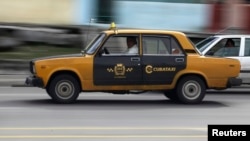HAVANA —
Thousands of Cuban state taxi drivers will soon be leasing their vehicles and working on their own as part of a reorganization of the country's taxi service aimed at improving efficiency, according to rules published on Wednesday.
The measure follows the similar transfer of barbers, beauticians, small cafeterias and other retail services by the state to what is called the “non-state” sector as part of market-oriented reforms under way in the Communist-run country.
Cuba nationalized all retail business in 1968, down to the shoe-shine shops, and fixed all prices. But in an attempt to stimulate the stagnant economy and reduce bureaucracy, it is giving some of it back in a form of legal private enterprise operating on a market basis.
The sector now numbers 445,000 people, or 5 percent of the labor force, and is made up of private, leased and cooperative small businesses, their employees, private taxi drivers, the building trades and others.
The administration of Cubataxi, which operates in the local U.S. dollar equivalent called the convertible peso (CUC), will be downsized. Drivers will become self-employed, leasing a vehicle from the company at a daily rate, according to the resolutions published in the official Gazette.
“The idea is to eliminate irregularities in the service, the stealing of fares and reduce inflated administrative payrolls,” said Debora Canela Pina, a transportation ministry specialist at Cubadebate, an official on-line news site.
Cubataxi drivers are notorious for not using their meters.
Canela Pina said the reorganization would improve service and 60 percent of taxis, many old Russian Ladas, would be replaced by newer models consisting of second-hand rental cars.
Outside the Havana Libre Hotel, two Cubataxi drivers said they hoped their new status would prove beneficial. Besides, they noted, they had no choice but to accept their fate or be laid off.
“This law should benefit us if there is no fine print and should be more efficient because the driver will have total control of his taxi and its maintenance,” said one driver, Alejandro Perez.
The new system is based on a pilot project in Havana begun in 2010 at a single garage.
Thirty of the more than 2,000 state taxi drivers in the capital began leasing their vehicles rather than working for a wage, a small percentage of the tips and whatever they could pocket on the sly.
Instead of three support staff for every driver, as in other garages, there were just three for the thirty.
“You pay 595 CUC ($595) for the car and then after a month 39 CUC plus 40 (Cuban) pesos a day,” Elio, one of the drivers, said at the time. He requested his last name be withheld.
The government reported that after the first year, the state's yearly take from each taxi was estimated to multiply 30-fold compared with before the experiment began.
Under the new rules, the daily rate was reduced to 23 CUC ($23) and costs can be deducted before paying income tax.
The drivers will be responsible for maintaining their taxi and gasoline, but can buy parts and services from the state company at reduced prices.
The measure follows the similar transfer of barbers, beauticians, small cafeterias and other retail services by the state to what is called the “non-state” sector as part of market-oriented reforms under way in the Communist-run country.
Cuba nationalized all retail business in 1968, down to the shoe-shine shops, and fixed all prices. But in an attempt to stimulate the stagnant economy and reduce bureaucracy, it is giving some of it back in a form of legal private enterprise operating on a market basis.
The sector now numbers 445,000 people, or 5 percent of the labor force, and is made up of private, leased and cooperative small businesses, their employees, private taxi drivers, the building trades and others.
The administration of Cubataxi, which operates in the local U.S. dollar equivalent called the convertible peso (CUC), will be downsized. Drivers will become self-employed, leasing a vehicle from the company at a daily rate, according to the resolutions published in the official Gazette.
“The idea is to eliminate irregularities in the service, the stealing of fares and reduce inflated administrative payrolls,” said Debora Canela Pina, a transportation ministry specialist at Cubadebate, an official on-line news site.
Cubataxi drivers are notorious for not using their meters.
Canela Pina said the reorganization would improve service and 60 percent of taxis, many old Russian Ladas, would be replaced by newer models consisting of second-hand rental cars.
Outside the Havana Libre Hotel, two Cubataxi drivers said they hoped their new status would prove beneficial. Besides, they noted, they had no choice but to accept their fate or be laid off.
“This law should benefit us if there is no fine print and should be more efficient because the driver will have total control of his taxi and its maintenance,” said one driver, Alejandro Perez.
The new system is based on a pilot project in Havana begun in 2010 at a single garage.
Thirty of the more than 2,000 state taxi drivers in the capital began leasing their vehicles rather than working for a wage, a small percentage of the tips and whatever they could pocket on the sly.
Instead of three support staff for every driver, as in other garages, there were just three for the thirty.
“You pay 595 CUC ($595) for the car and then after a month 39 CUC plus 40 (Cuban) pesos a day,” Elio, one of the drivers, said at the time. He requested his last name be withheld.
The government reported that after the first year, the state's yearly take from each taxi was estimated to multiply 30-fold compared with before the experiment began.
Under the new rules, the daily rate was reduced to 23 CUC ($23) and costs can be deducted before paying income tax.
The drivers will be responsible for maintaining their taxi and gasoline, but can buy parts and services from the state company at reduced prices.






